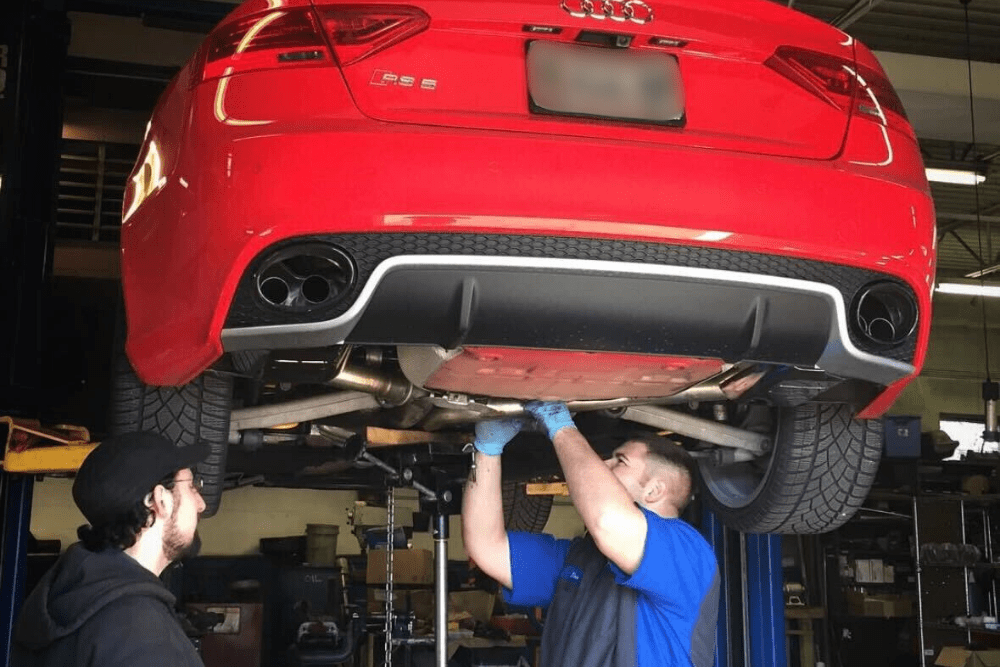How to Talk to Your Mechanic: Tips for Communicating Effectively About Your Euro Car Repairs
Ever feel like your mechanic is speaking another language? You’re not alone. Explaining what’s wrong with your car can sometimes feel like guessing at a medical diagnosis—frustrating, confusing, and full of jargon. But just like a good doctor, a good mechanic relies on clear, accurate information to diagnose the issue and get you back on the road.
At C’s Autohaus, we know that effective communication makes all the difference in avoiding unnecessary repairs, unexpected costs, and multiple trips to the shop. That’s why we’ve put together this guide to help you describe your car’s issues in a way that makes sense—to you and to us.
Let’s break down how to talk to your mechanic, avoid common miscommunications, and make sure your car gets the care it needs the first time.

Why Clear Communication Matters in European Auto Repair
Your BMW, Audi, or Porsche is a precision-engineered machine. Unlike domestic vehicles, European cars often have unique maintenance needs, specialized components, and advanced diagnostic systems. When discussing an issue with your mechanic, the more specific you can be, the better.
Many customers make the mistake of trying to diagnose the problem themselves. Instead, focus on describing symptoms rather than assuming what’s wrong. For example:
- Instead of saying, “I think my car needs an alignment,” say, “My car shakes at highway speeds, but I don’t feel it in the steering wheel.”
- Instead of saying, “My A/C is broken,” say, “My air conditioner blows warm air when I’m idling but gets cooler when I drive.”
This approach ensures that the mechanic can properly diagnose and fix the issue.
How to Describe Car Issues Like a Pro
When you bring your car to a trusted auto repair shop in Centerville, OH, providing clear, detailed information about your vehicle’s symptoms can make all the difference. The more specific you are, the faster your mechanic can pinpoint the issue—saving you both time and money.
1. Be Specific About Symptoms
Your mechanic isn’t a mind reader! Instead of guessing what’s wrong, focus on describing the symptoms in detail. Consider:
- When does the issue occur? (Only when the car is cold? After long drives? At high speeds?)
- What do you hear, feel, or smell? (Grinding noise? Burning smell? Vibrations?)
- Where is it happening? (Front or rear? Left or right side?)
- Has anything changed recently? (New tires? Dashboard warning lights? Recent repairs?)
For example, instead of saying “My car makes a weird noise,” try:
“When I accelerate, I hear a high-pitched squeal from the front, but it stops when I slow down.”
This level of detail gives your mechanic a solid starting point for diagnosing the issue.
2. Use Simple Terms, Not Jargon
You don’t need to know technical terms—just describe what you experience. Using the wrong lingo can create confusion, leading to unnecessary repairs.
- Say: “I hear a knocking sound when I turn left.”
- Don’t say: “I think my tie rod is bad.”
- Say: “The brakes feel soft, and I have to press harder than usual.”
- Don’t say: “I need a new master cylinder.”
Your mechanic will ask follow-up questions if needed, so focus on the symptoms rather than self-diagnosing.
3. Don’t Rely on Google for Diagnoses
While researching your car’s issue online can be helpful, it’s not a substitute for a professional diagnosis. Many symptoms can be caused by multiple issues, and misdiagnosing could lead to unnecessary or incorrect repairs.
Instead of telling your mechanic what you think is wrong, describe the problem and let them do the diagnostics. The certified technicians at C’s Autohaus have the expertise and tools to identify and fix the issue accurately.
Understanding What Your Mechanic Tells You
Once your mechanic has diagnosed the problem, they’ll explain what auto repairs are needed. Here’s how to navigate that conversation:
1. Ask for a Priority Breakdown
If multiple repairs are recommended, ask them to categorize them into:
- Critical (Safety-related) – Must be fixed immediately to prevent breakdowns or accidents.
- Recommended (Performance-related) – Affects drivability but isn’t urgent.
- Maintenance (Preventative care) – Services like oil changes and fluid flushes that help extend your car’s life.
For example, if your brake pads are at 3mm, your mechanic might say:
“We recommend replacing them now to avoid rotor damage.”
This helps you prioritize brake repairs based on safety, performance, and budget.
2. Ask About Costs and Options
Repairs can add up, so don’t hesitate to ask:
- “Are there different options for replacement parts?” (OEM vs. aftermarket)
- “What happens if I delay this repair?” (Some issues worsen over time, others don’t.)
- “Can I break these repairs into stages?” (If multiple fixes are needed, some might wait.)
At C’s Autohaus, we believe in fair, transparent pricing so you know exactly what you’re paying for.
Trust C’s Autohaus for Your Next Euro Car Repair—Let’s Talk!
Whether it’s time for routine maintenance, a performance upgrade, or expert Euro auto repair in Centerville, OH, our team at C’s Autohaus is here to help. We believe in clear communication, honest service, and top-quality repairs—because you deserve a mechanic who truly understands your vehicle.
Got a question about your Mercedes, Jaguar, or Volkswagen? We’d love to chat! Call us at 937-428-6040 or visit us at 1690 Thomas Paine Pkwy, Centerville, OH 45459.

